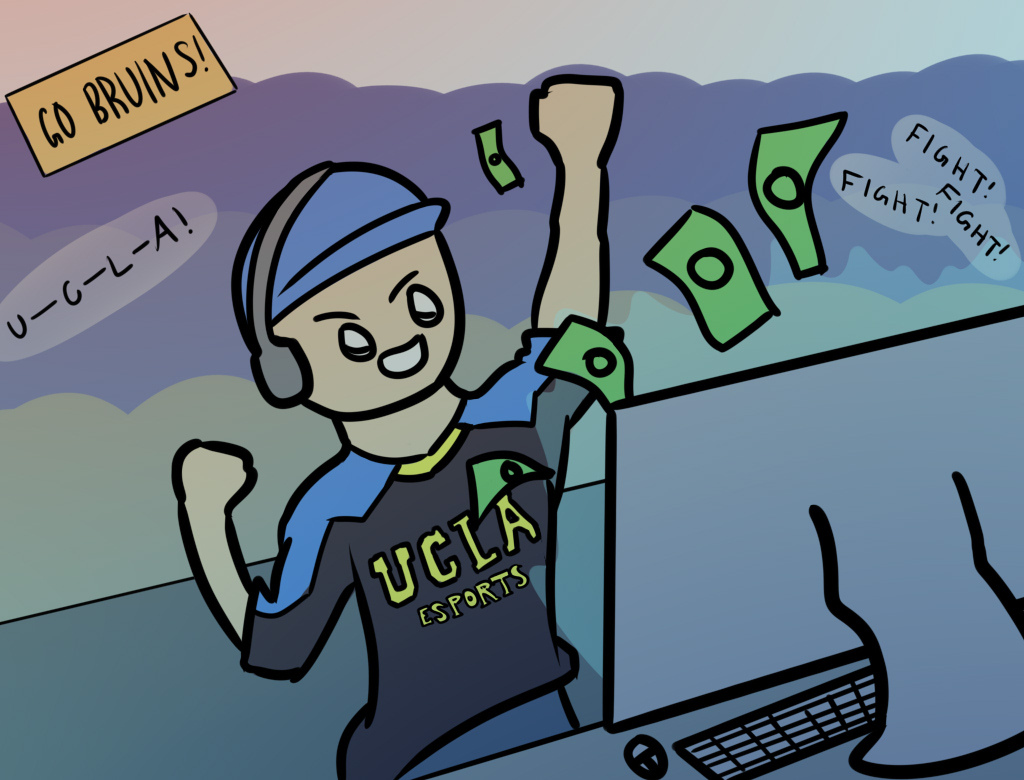UCLA should bolster its support for the esports community, further invest in program

(Kyle Icban/Daily Bruin)
By Thet Lin Tun
Jan. 28, 2020 11:05 p.m.
It is no longer 2008 – to treat video games as simply another pastime is obsolete.
But UCLA has yet to fully commit toward establishing such a space for Bruin gamers who see gaming as more than a pastime.
The advent of collegiate esports, or professional multiplayer entertainment video games, has experienced unprecedented growth in recent years. In the last four years, the National Association of Collegiate Esports has grown from six to over 170 member schools. University of California, Irvine’s renowned esports program, for instance, offers scholarships, educational courses, streaming programs and an esports arena for gamers.
By comparison, UCLA is still playing catch up.
The university has recently established a program called UCLA Esports at the request of students looking to play esports competitively, or simply searching for a like-minded community.
UCLA provides the organization with financial and supervisory support, which includes funding to advertise its brand, buy supplies and build physical esport facilities. The university also provides access to internal infrastructure, such as van rentals and access to on-campus spaces, that other club sports have.
Establishing esports as a club sport program is a good first step.
But as students enter a new decade, UCLA should go beyond the current level of support for the esports community. The university has an opportunity to expeditiously legitimize esports by establishing it as an official program that includes scholarships and increased funding for its gamers. In doing so, the university could use its power and reputation to galvanize the recognition of esports in the larger collegiate circuit.
Scholarships are a crucial step in validating a community that has largely played under the radar.
“Ideally, down the line, I would hope that our teams would get scholarships,” said Ashley Denktas, the director of UCLA Esports. “Because from my perspective, if UCLA really wants to be the No. 1 esports college team, you need to be able to recruit the best.”
The esports industry has maintained 400 million fans globally, and has gained revenues reaching $900 million last year. By the end of this year, those numbers are expected to hit the $1 billion threshold – meaning there are more opportunities than ever to receive scholarships in the esports industry.
UCLA could secure private partnerships with these esports industry giants, as well as taking initiatives to directly fund scholarships for competitive gamers – especially considering that esports viewership now rivals that of traditional sports.
Increased funding for the esports program can also help further legitimize the competitive realm.
Riley Dunne, a fourth-year astrophysics student and a former player for the varsity team UCLA Hearthstone Blue, said there’s a need for increased funding from the administration.
“Personally, we can see the variation in funding that schools get,” Dunne said. “It was kind of a bummer thinking how much more we could have been if we had been more financially and administratively supported.”
And in the esports world, securing funding can sometimes mean staying competitive.
“I think UCLA helping us, by buying (Hearthstone) packs or subsidizing, would really help to take out the monetary aspect of the game,” said Johnny Nguyen, a second-year mechanical engineering student and the captain of the junior varsity team UCLA Hearthstone Gold.
So far, the administration has shown promise by directly funding UCLA Esports’ efforts to host the PAC-E League of Legends Invitational on campus, which is the esports variant of the PAC-12 conference.
But UCLA shouldn’t stop there. Given that esports events for Dota 2 and League of Legends generate massive turnouts of around 10,000 people, UCLA would not have trouble filling out the seats as long as it communicates these events to the community.
And the administration is starting to recognize that potential.
By granting UCLA Esports the funds necessary to establish a 17-PC training center for scrimmages, practices and official games in the John Wooden Center, they’ve made a small step in the right direction.
“The practice room was one of the biggest things we got from the administration that helps legitimize esports at UCLA. Space on campus at UCLA is a limited commodity and you always have to fight for it,” Denktas said. “The fact that we’ve got it right in the center of campus means that esports is being taken seriously.”
And while there have been some improvements, the fact that other universities have committed entire buildings and community centers toward esports indicates that UCLA has room to grow in terms of supporting the gaming community.
Granted, the university’s room to grow geographically is a bit more limited.
Campuses like UC Berkeley and Irvine have abundant spatial resources in comparison to UCLA. As the smallest campus in size with the largest student population, it is true that investing in a new space might be a difficult endeavor – especially in already overcrowded Westwood. However, the potential revenue and high viewership – from both live attendance and streaming – would stand to benefit UCLA financially, as well as gamers who hope to play competitively.
There are multiple venues for students to play sports on UCLA’s campus. The massive population of gamers deserves more than just a room inside a gym.
The collegiate esports industry has proven time and time again that it’s an industry worth investing in. And considering UCLA isn’t one to shy away from funding opportunities, it seems uncharacteristic of the university to not further support the esports community.
The university is top tier in everything else it does – and it could be an institution gamers aspire to represent on the global collegiate circuit.
But if it doesn’t want to be No. 1, it could at least do better for competitive gamers – who have been the black sheep of the family for too long.

